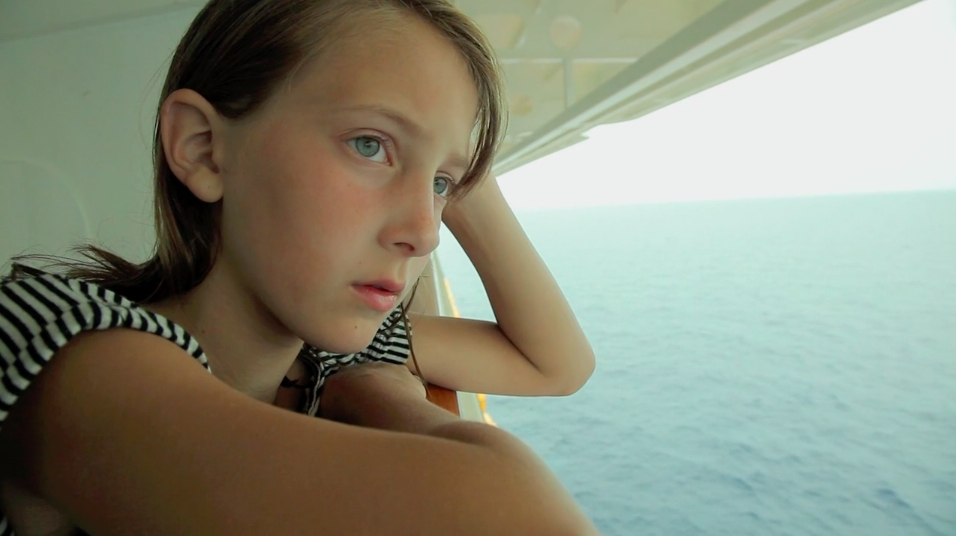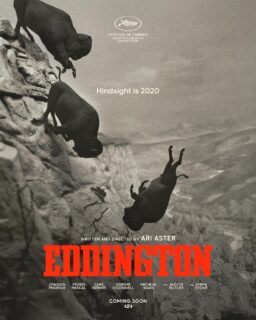Corinne Anderson was traveling on a cruise ship when she decided to make a short film on a whim. Guided by the idea of making something dreamlike, she captured images of her sister, Greta Stolte, wandering about the ship, gazing at the water below. While editing the footage together, Anderson accompanied it with her own score and narration, thus giving voice to a slumbering adult dreaming that she is the girl flickering on the screen. Her voice reminded me of Daisy Ridley in the recent English dubbed version of Isao Takahata’s 1991 animated masterpiece, “Only Yesterday,” as she reflects on apparitions that may be fragments of memories from her past, or perhaps an alternate reality. What Anderson captures here so deftly is the perplexity one feels after having a dream that seems more vividly real than waking life.
Though Anderson is best known for her work in the camera department on “Chicago P.D.”, her movie, “Ship Dreams,” which made its world premiere at last night’s Midwest Independent Film Festival, solidifies her status as a filmmaker of immense promise. Her intuition led her to make something that is utterly transcendent, an impeccably nuanced gem that I’d put right alongside the best shorts I’ve seen. These are the kind of pictures that keep me coming back to Mike McNamara’s monthly screening series in Chicago spotlighting the work of filmmakers in the midwest. The annual Female Filmmakers Night is a favorite of mine, and this year’s installment did not disappoint, compiling a rich variety of styles and approaches encompassing no less than 15 selections. The evening featured everything from a playful music video (Jenna Caravello’s “Hermit”) and a stop-motion cautionary tale (Cristen Leifheit’s “Yellow Gold”) to a grotesquely amusing flip book (Lisa Barcy’s “Grub”).
Kara Mulrooney’s “An Evening at Angelo’s” lovingly profiled a time that has since passed, preserved for decades at Angelo’s Piano Lounge in Milwaukee. To enter the venue was akin to stepping into a time machine, and the film is all the more haunting in light of the lounge’s recent remodeling following the death of its beloved owner, Angelo Mortellaro. Ashley Brandon’s “Where We’ve Been” was similarly evocative in its exploration of how family memories are filtered through the generations, and how history must be passed on before it fades. Two striking shorts from Emily Tolan crafted indelible visual metaphors regarding the objectification of women (“Decay”) and repetitive cycles that must be broken (“Paradise Lost”). Though it received one of the evening’s most enthusiastic receptions, I personally found Gail Gilbert’s prize-winning thriller, “Democracy in the Driver’s Seat,” a touch too far-fetched for its own good—that is, until the startlingly ironic ending. During the Q&A afterward, Gilbert discussed the metaphorical nature of the film, which she intended as a commentary on how people tend to vote without understanding what, in fact, they are voting for (she cited Brexit as a recent example).
The impact of texting on relationships was tackled comedically in Rani Deighe Crowe’s “Texting: A Love Story,” and tragically in Di Delgado Pineda’s “Yo No Soy Esa.” The timeless comedy of embarrassment seeped into several shorts, especially Sarah Fornace’s “The Blow Up Bra,” the latest brilliant work from Manual Cinema, a performance collective and production company specializing in shadow puppetry. Mia McCullough tenderly observed the awkward yet affectionate dynamic between a driving instructor and his young student in “Parallel,” a quiet vignette containing one brief, jarring moment that had the entire audience jumping out of their seats. The very funny Fawzia Mirza lit up the screen in Lisa Donato’s “Spunkle,” and later revealed in the Q&A that she will soon begin production on “Signature Move,” an ode to “life, love and lady wrestling” directed by Jennifer Reeder. The night concluded with Reeder’s celebrated short, “Crystal Lake,” a film about girls who take over a skate park and turn away boys who’ve never heard of Angela Davis.
Preceding the screening was a spirited panel moderated by Melissa Thornley and featuring WGN’s Amy Guth along with Julia Sweeney, the great comedian from “Saturday Night Live” and creator of the monologue-turned-film, “God Said Ha!” Guth is currently working on an episodic documentary about online harassment targeting women, which she believes is a global issue and public health crisis. The project is a personal one for Guth, whose personal information was made public by men’s rights activists in ways that were somehow not deemed illegal. Sweeney will be directing a film of her own next year that focuses on the simmering tensions between a group of characters cloistered together in the Chicago suburbs. She promises that the film will be funny, and said that her favorite kind of comedy is often found in the saddest subject matter, such as the relationship between two people who are incompatible.
With female filmmakers like “Wonder Woman” director Patty Jenkins having to wait an inordinate amount of time (13 years, in her case) to make their second feature, even after having earned great acclaim with their debuts, I believe that events like Female Filmmakers Night are more vital than ever. Here is a mere sampling of the visionaries who deserve to have every bit as many opportunities as their male counterparts. Let’s hope we see more work from them in the near future, and let’s hope they—including Jenkins—get final cut.
Watch “Ship Dreams” below.
Ship Dreams from Corinne Anderson on Vimeo.












